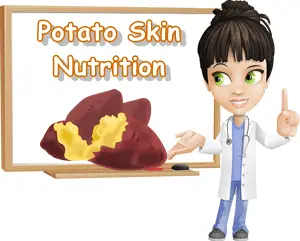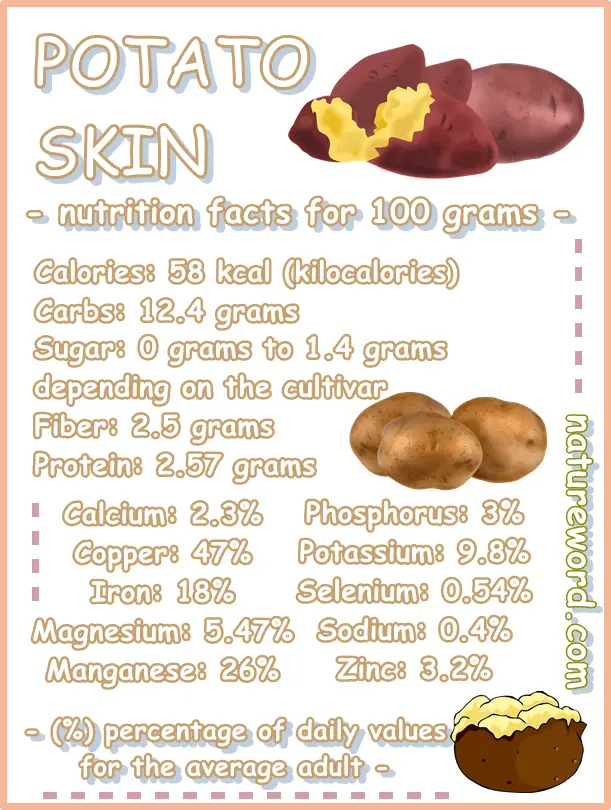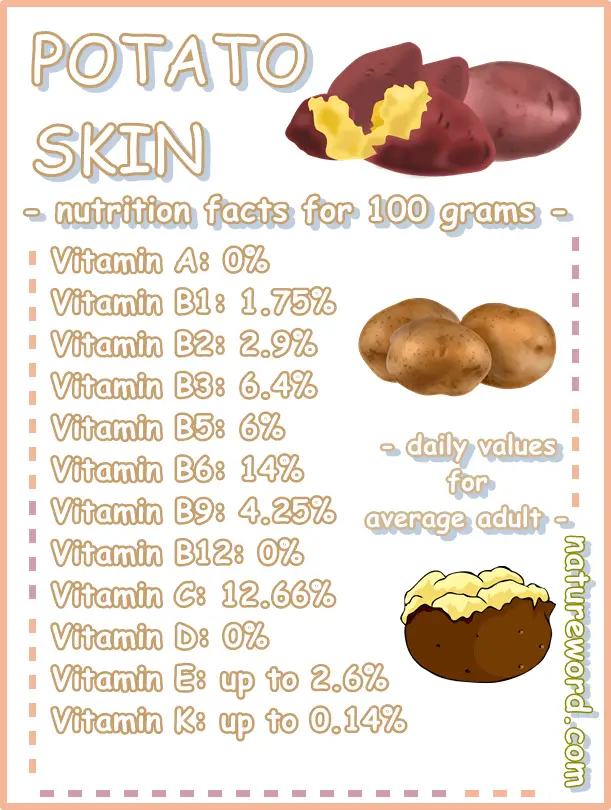Potato skin is something you can eat as it’s edible, and perfectly safe to eat cooked. But are there any benefits to eating potato skins? Are there nutrients in potato skin? What is the nutritional value of potato skins? How much of your daily values of essential vitamins and minerals and how many calories does potato skin get you?
Should you eat potato skin?
We’ve already made it clear that you can eat potato skin, but should you? Except for rare exceptions, potato skin is perfectly safe to eat.
And because it contributes to daily nutritional values measurably, potato skin is not bad for you, but actually good.
However, the raw peel is a tough fiber that is resistant to digestion and causes stomach upset and other side effects which is why it’s a good idea to always have it cooked such as baked, boiled or fried, together with the flesh.

Nutrition facts per 100 grams of raw potato skin:
- Energetic value (calories): 58 kcal (kilocalories, calories)
- Carbohydrates content: 12.4 grams of carbs (total, including sugar)
- Sugar content: 0 grams – 1.4 grams of sugars (depending on the cultivar)
- Fiber content: 2.5 grams of dietary fiber (about the same amount as in blueberries)
- Protein: 2.57 grams of protein (potato skin is not complete protein and does not have all essential amino acids)
- Fat content: 0.1 grams of fat
- Water content: 83 grams of water (exact content may differ depending on the cultivar)
Vitamins in 100 grams of potato skin:
- Vitamin A: 0 – 1 micrograms (or very small amounts, negligible in comparison to daily values)
- Vitamin B1: 0.021 milligrams
- Vitamin B2: 0.038 milligrams
- Vitamin B3: 1.03 milligrams
- Vitamin B5: 0.302 milligrams
- Vitamin B6: 0.239 milligrams
- Vitamin B9: 17 micrograms
- Vitamin B12: 0 micrograms
- Choline: 0 – 30 milligrams
- Vitamin C: 11.4 milligrams
- Vitamin D: 0 micrograms
- Vitamin E: 0 – 0.4 milligrams (negligible content)
- Vitamin K: 0 – 1.7 micrograms
Minerals in 100 grams of potato skins:
- Calcium: 30 milligrams
- Copper: 423 micrograms
- Iron: 3.24 milligrams
- Magnesium: 23 milligrams
- Manganese: 0.602 milligrams
- Phosphorus: 38 milligrams
- Potassium: 413 milligrams
- Selenium: 0.3 micrograms
- Sodium: 10 milligrams
- Zinc: 0.35 milligrams
Nutrition facts from USDA.gov.

Potato skins daily values of vitamins and minerals (for 100 grams)
- Energetic value: 100 grams of raw potato skin gets the average adult person just 2.9% of their daily calories (based on a caloric intake of 2000 kilocalories a day).
- Carbohydrates: 4.5% of daily requirements for an adult person
- Dietary fiber: 8.9% of daily requirements
- Protein: 5.1% of daily requirements
- Fat: 0.128% of daily requirements
- Sugar: The average adult can eat up to 50 grams of added sugar a day from foods with sugar added to them, but potato skins do not contribute to daily sugar allowance as they have no added sugar.
- Water content: Raw potato skin is over 83% water. Cooking it can either increase its water content (e.g. boiling), or reduce it by about half (e.g. baking).

Potato skin vitamins: Daily Values per 100 grams
- Vitamin A: 0%
- Vitamin B1: 1.75%
- Vitamin B2: 2.9%
- Vitamin B3: 6.4%
- Vitamin B5: 6%
- Vitamin B6: 14%
- Vitamin B9: 4.25%
- Vitamin B12: 0%
- Choline: 0% to 5.6%
- Vitamin C: 12.66%
- Vitamin D: 0%
- Vitamin E: 0% to 2.6%
- Vitamin K: 0% to 0.14%
Potato skin minerals: Daily Values per 100 grams
- Calcium: 2.3%
- Copper: 47%
- Iron: 18%
- Magnesium: 5.47%
- Manganese: 26%
- Phosphorus: 3%
- Potassium: 9.8%
Note: Also see how much potassium in potatoes of different sizes, both red and white varieties.
Note: Also see what is the potassium content of cooked potatoes, including boiled and baked potatoes, potato skin and potato chips.
- Selenium: 0.54%
- Sodium: 0.4%
- Zinc: 3.2%
